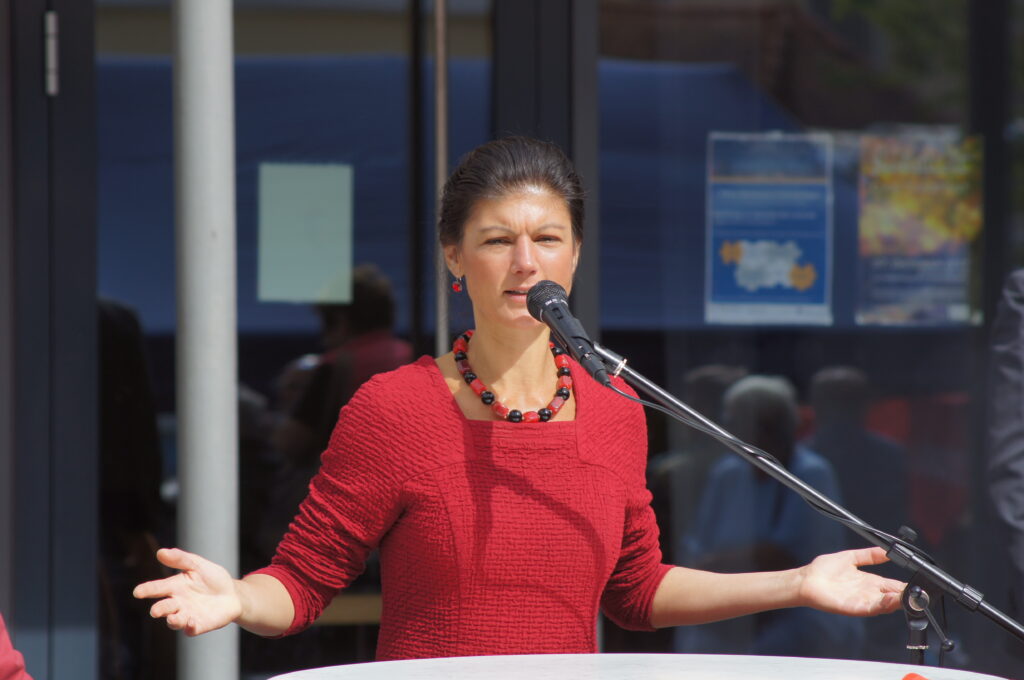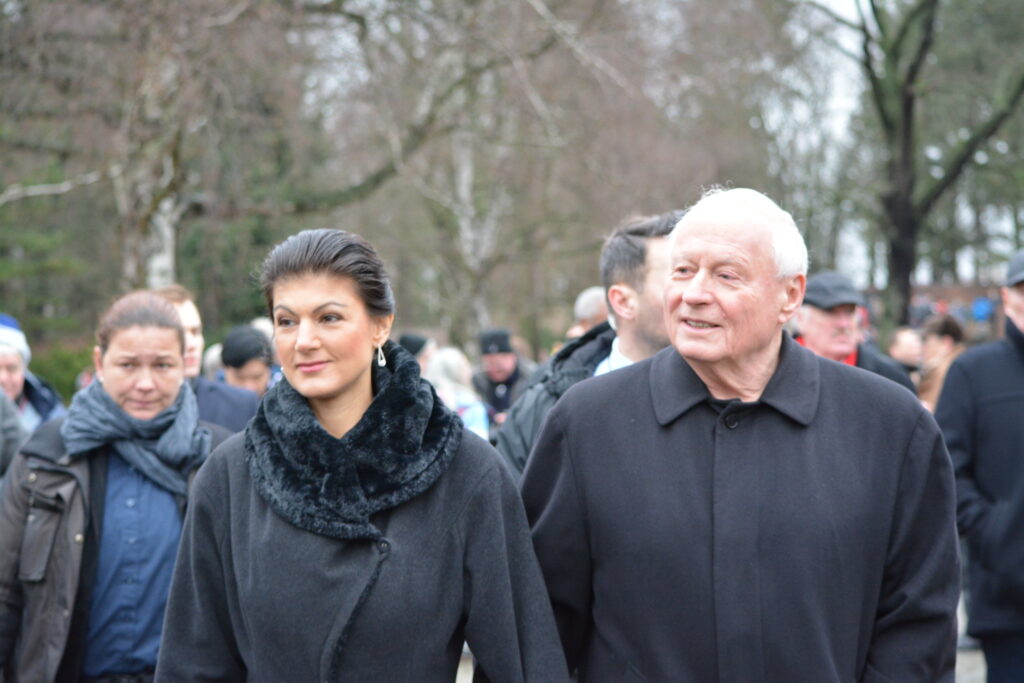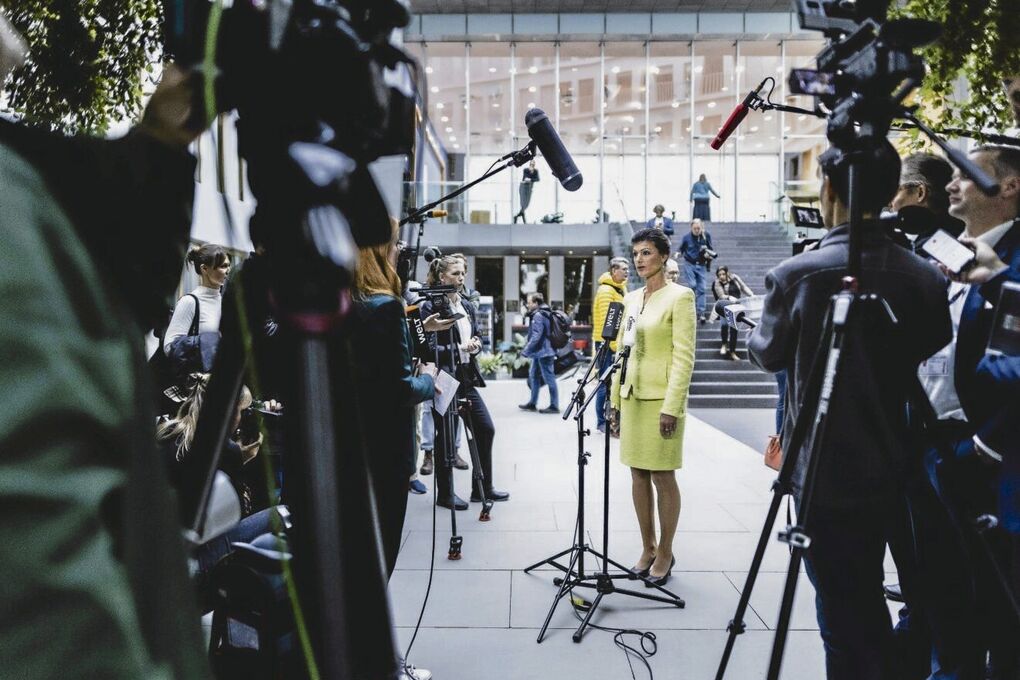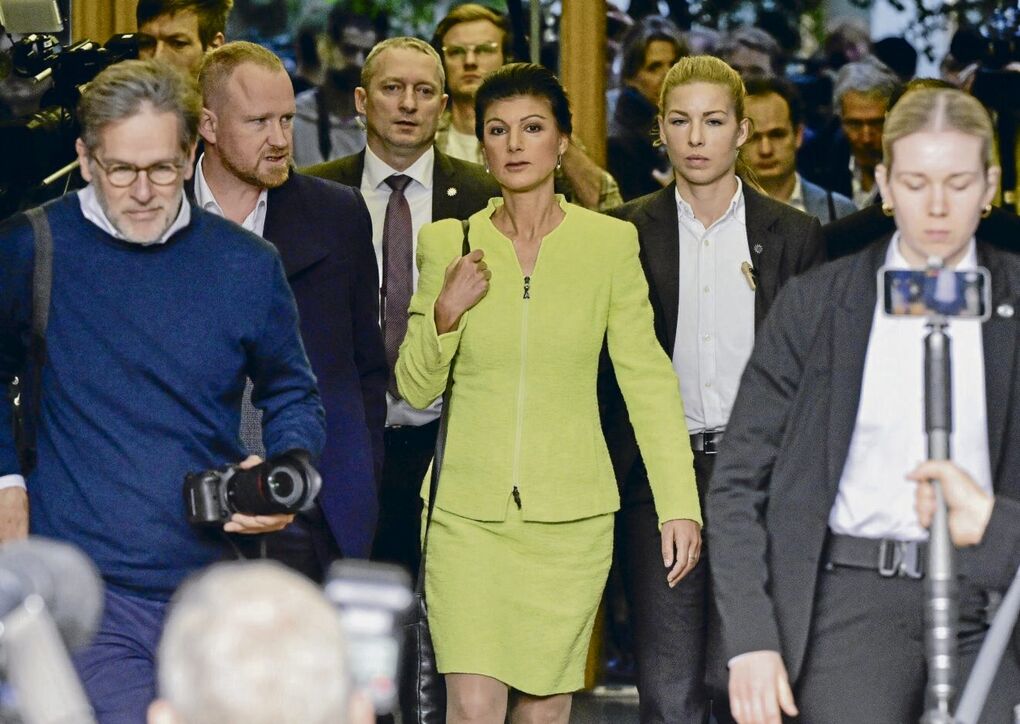Tras un largo período de especulaciones, la figura principal del “conservadurismo de izquierda” alemán, Sahra Wagenknecht, otros nueve diputados y políticos de Die Linke abandonaron el partido y planean formar uno nuevo, más a la derecha, aunque seguirían en el mismo bloque para no perder su status de grupo parlamentario. Los motivos de la división y nuestra opinión.
Por Carolina Menéndez Trucco
El final anunciado de una dura historia de separación: la cara principal del populismo “rojo” en Alemania, Sahra Wagenknecht, luego de meses considerando abandonar el partido Die Linke, finalmente presentó la entidad que debe promover la fundación del nuevo “Por la Razón y la Justicia”. La asociación «Alianza Sahra Wagenknecht[1]» tiene como objetivo crear a principios del próximo año el flamante partido que luego se presentará por primera vez a las elecciones regionales de Alemania. Cualquiera que vaya a las elecciones europeas de 2024 también debería encontrar una nueva opción en las boletas de votación. Además de Wagenknecht, entre diputados y políticos, otros 15 declararon su salida con la carta abierta “Por qué abandonamos La Izquierda”. Si bien, según sus propias declaraciones, inicialmente quieren seguir perteneciendo al grupo parlamentario de izquierda en el Bundestag, el cual cuenta actualmente con 38 miembros, si hay dos diputados menos, ya no se alcanza el número mínimo actual. En otras palabras, La Izquierda está amenazada de extinción como fracción parlamentaria.
Más que moverse por la “razón económica”, la “justicia social”, la “paz” y la “libertad”, la dirigencia del nuevo partido simplemente se encamina hacia la derecha. El manifiesto fundacional presentado, aunque evita tal clasificación y habla más bien de un “retorno a la razón”, de alguna manera la hace evidente. Según las encuestas, entre los seguidores de Wagenknecht hay muchos más votantes del partido de ultraderecha AfD que de la propia izquierda. Además, las posiciones sobre política migratoria o climática están más cerca del grupo conservador CDU/CSU que las de su ex partido. De acuerdo con su línea de conservadurismo, la «inmigración no regulada» está agravando «los problemas en las escuelas, especialmente en las zonas residenciales más pobres». Por ello pide que se limite el número de refugiados. Más aún, la controvertida figura pretende “alejarse del eco-activismo ciego y desordenado que encarece aún más la vida de las personas, pero que en realidad no beneficia en absoluto al clima”. Nada más alejado de lo social y el medio ambiente.
Si bien muchos se han resignado a tomarlo como una señal de respeto propio o una oportunidad para una renovación, desde hace tiempo se podía entrever que La Izquierda estaba ante su separación. Pero el hecho de que diez miembros del Bundestag (Parlamento) encabezados por Wagenknecht y otros políticos abandonaran Die Linke fue una sorpresa. Con todo, aun cuando ambos partidos reconocen no querer trabajar juntos, pretenden seguir formando parte de la facción para mantener el aparato. De hecho, los que se marcharon han solicitado oficialmente permanecer en la facción de izquierda hasta finales de año.
Disputas y falsos contrastes
En más de una oportunidad, Sahra Wagenknecht ha generado polémica. Las discrepancias con algunos de los sectores de la izquierda son bien conocidas, por ello los llamados de exclusión recurrentes de parte de varios miembros. Uno de ellos al rechazar las sanciones a Rusia por la guerra y el suministro de armas a Ucrania, en su afán “diplomático” y “antimilitarista” por defender la vía del diálogo y la negociación. El “Manifiesto por la paz”, en el que Sahra Wagenknecht y la también controversial activista Alice Schwarzer recogieron más de medio millón de firmas para detener el envío de armas a Ucrania, generó mucho debate, incluso en la izquierda. Porque una postura correcta es no aumentar el presupuesto militar, pero otra, incorrecta, es impedir que le lleguen armas al pueblo ucraniano que tiene derecho a defenderse de la invasión rusa.
Por otro lado, con respecto al genocidio sionista en Palestina, Wagenknecht es ambigua… pero termina defendiendo a Israel. Si bien describe la Franja de Gaza como una “prisión al aire libre”, también observa que Israel tiene derecho a defenderse de los ataques de Hamas y apoya la cínica salida de «dos estados”, cuando uno quiere deliberadamente exterminar al otro.
Cabría preguntarse cómo puede ser que términos como capitalismo, imperialismo, socialismo, clase obrera, sociedad de clases o izquierda ni siquiera aparezcan en el manifiesto fundacional de la “Alianza Sahra Wagenknecht”, presentado en la conferencia de prensa federal el 23 de octubre. Es un abandono de la ya reformista política general de Die Linke. Pues habría que remontarse a los comienzos.
Los inicios de Wagenknecht…
Poco antes de la caída del Muro, Wagenknecht se unió al SED[2] en 1989. Su primera polémica la desató tres años más tarde, cuando intervino en el debate sobre el estalinismo en el partido, que desde entonces pasó a llamarse PDS[3], al publicar el texto Marxismo y oportunismo en el periódico Weißenseer Blätter. De defender ayer a la Alemania oriental burocrática ha pasado a defender hoy un Estado populista, antimigrantes y antiambiental. Miembro del Parlamento Europeo de 2004 hasta 2009, del Bundestag alemán desde 2009, y desde 2011 vicepresidenta de la facción de izquierda. En su cargo, sin embargo, a menudo estuvo en desacuerdo con la dirección del partido, causando revuelo dentro del mismo en reiteradas oportunidades. En el transcurso sus pasos hacia la derecha fueron cada vez más firmes. Cuando ingresó al parlamento, por ejemplo, abandonó la Plataforma Comunista[4] y la Izquierda Anticapitalista[5], habiendo firmado el llamamiento en 2006 para la fundación de ésta última.
Nacida en Jena en 1969, hija de padre iraní y madre alemana, casada hace casi diez años con otra figura legendaria del populismo conservador de izquierda, Oskar Lafontaine, sin dudas, Sahra Wagenknecht se fue constituyendo como una de las caras más conocidas del partido Die Linke hasta que anunció su marcha y la fundación de la asociación BSW – Por la Razón y la Justicia, con el objetivo de preparar su nuevo partido político.
El quiebre revolucionario
La fractura de Die Linke refleja la desorientación de La Izquierda alemana: ya no quedan revolucionarios en sus filas y el partido se terminó enfrascando cada vez más en su “parlamentarismo burgués”. Si bien él mismo ha registrado más entradas que dimisiones desde la salida de Wagenknecht, el problema especial ahora requiere de una acrobacia política, ya que el estatus de facción pende de un hilo. Lo que no solo involucra la capacidad política de acción de los representantes de izquierda, sino también el destino de los 108 empleados del grupo parlamentario. Si el estado de la facción desaparece, deben ser liberados. Además, los miembros del grupo parlamentario Die Linke que fueron elegidos directamente para el Bundestag, reclaman a los diez miembros del grupo parlamentario que abandonaron el partido para crear uno rival que renuncien a sus mandatos. En definitiva, junto a desertores y posibles desempleados, se trata del valor del bloque de izquierda como fuerza política.
En las elecciones generales de septiembre de 2021, La Izquierda quedó con un 4,9 % de los votos por debajo del umbral requerido del 5 % para mantenerse en el parlamento, pero pudo hacerlo por haber ganado tres mandatos directos previos. De todas formas, es necesario algo más que el statu quo para resolver el dilema de la unidad. Examinar las circunstancias que llevaron a la división podría haber sido una de las claves. Pues al debilitamiento extraparlamentario de la Izquierda Anticapitalista, se le sumó la insuperable brecha entre el ala reformista y el ala Wagenknecht. La conferencia fundacional del nuevo partido está prevista para enero y para entonces puede que la facción de izquierda haya pasado a la historia. En la tierra de Marx, la revolución socialista y un gobierno de los trabajadores y el pueblo, es aún una cuenta pendiente. Por eso es necesaria la unidad de los grupos y activistas revolucionarios ubicados a la izquierda del reformismo.
[1] BSW – Por la Razón y la Justicia (BSW – Für Vernunft und Gerechtigkeit) es una asociación política registrada con el propósito de fundar el partido político alemán: Por la Razón y la Justicia. BSW es un acrónimo para «Alianza Sahra Wagenknecht» (Bündnis Sahra Wagenknecht).
[2] El Partido Socialista Unificado de Alemania (Sozialistische Einheitspartei Deutschlands, abreviado SED, o PSUA) fue el partido político alemán de la República Democrática Alemana (RDA), comúnmente denominada también Alemania Oriental, Alemania Democrática o Alemania del Este. Un Estado “socialista” dirigido por una burocracia stalinista que existió durante el período de la Guerra Fría, aliado al bloque Oriental (comunista).
[3] El Partido del Socialismo Democrático (PDS, Partei des Demokratischen Sozialismus) fue un partido político alemán socialista, heredero del antiguo Partido Socialista Unificado de Alemania (SED).
[4] La Plataforma Comunista (Kommunistische Plataforma, KPF) es una asociación dentro del Partido de Izquierda Alemán del ala más radical cuyo miembro más destacado fue Sahra Wagenknecht.
[5] La Izquierda Anticapitalisrta (Antikapitalistische Linke, AKL) es un movimiento político fundado en marzo de 2006 en el seno del partido Die Linke, que representa posiciones anticapitalistas, antimilitaristas y críticas con el parlamento. Se la considera también del ala más radical del partido.









